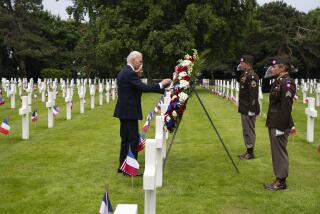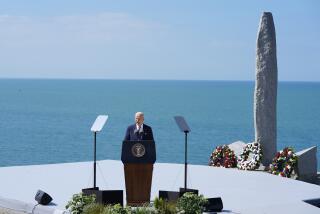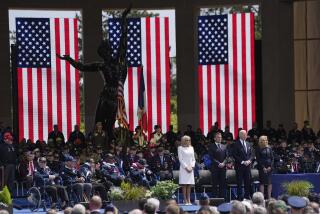They Gave America Benefit of the Doubt
- Share via
The anniversary of D-day today offers an opportunity for Americans to remember what we fought for and who fought for our country. Although they were not seen in Steven Spielberg’s “Saving Private Ryan,” African American soldiers were present at Omaha Beach. Serving in a segregated military, they were there unloading the ships and feeding the combat troops. Our nation was fighting the Nazis with a Jim Crow army. Without their vital support, the Allies would have been beaten back to the beaches by the fierce Nazi counterattack.
Composing half of the transportation corps in Europe, black soldiers contributed to the success of the invasion in a crucial way. In the D-day invasion, veteran Timuel Black recalled, “We were really stevedores . . . . I went into Normandy with combat troops. We serviced them.”
Support work was especially dangerous. “The Germans aimed at our supplies,” said Black. “We were direct targets. I’d been on 6x6 trucks many nights when the Luftwaffe was strafing us, dropping those small bombs and firing those machine guns at us.”
Black soldiers advanced beyond the beaches, feeding an enormous army in movement. “We were in Belgium during the Battle of the Bulge,” Black boasted. “We were at one time feeding 3 million soldiers: the First, the Third, the Ninth and the British Seventh armies.”
Altogether, 1 million African Americans served in uniform to defend a democracy that had excluded them. One of them explained why many black men and women enlisted. In a letter published in the Pittsburgh Courier, Jan. 31, 1942, James G. Thompson wrote: “Being an American of dark complexion and some 26 years [old], these questions flash through my mind: ‘Should I sacrifice my life to live half-American? Would it be demanding too much to demand full citizenship rights in exchange for the sacrificing of my life?’ ” Thompson insisted he would fight, but only for “double victory”--victory over fascism abroad and victory over racism at home.
Our memory of World War II continually contours the cultural landscape of our identity as Americans--who we are as Americans and what our nation stands for. But how do we remember this past? Whose stories of heroism and sacrifice do we remember and retell?
When told more inclusively and hence more accurately by historians and also by filmmakers, the story of D-day and the winning of World War II shows that African Americans shared what Lincoln called “our mystic chords of memory, stretching from battlefields to patriot graves.”
Offering hope that a diverse American people can still become one nation, this larger memory of the war gives all of us ties that bind in our still unfinished struggle for “victory” at home.
More to Read
Sign up for Essential California
The most important California stories and recommendations in your inbox every morning.
You may occasionally receive promotional content from the Los Angeles Times.










